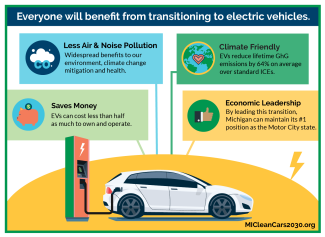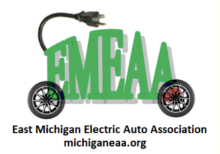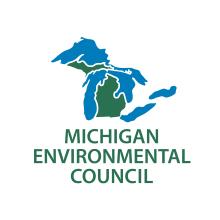For Michigan to reach its Healthy Climate Plan goals and to remain the nation's automotive leader, a speedy transition to EVs is critical for our future.
The MI Clean Cars 2030 campaign is committed to making electric vehicles the optimum choice for Michiganders by 2030, achieving Governor Whitmer's goal of 2 million EVs and making EVs accessible to everyone--especially the most gasoline-burdened drivers. We must take Michigan's commitment to the next level for this to be possible.
The Path to Michigan's EV Future
As the nation's automotive leader, Michigan must lead the national transportation electrification to remain competitive and reach the MI Healthy Climate plan goals. To do this, it needs to spearhead all aspects of the transition– research & development, production, and sales. While the state has been rapidly bolstering its R&D and production of EVs and advanced batteries, it lags significantly behind in EV sales and drivers. Even worse, Michigan recently ranked 26th among states on EV-friendly policies in the United States. We can and must do better to attract the EV expertise and industry necessary to strengthen the health of its communities and economy while maintaining Michigan's auto leadership.
The benefits of transitioning to EVs are much more than a boost to Michigan's economy. It's crucial for the health of our state. As a state with high asthma rates, we can reduce air pollution by electrifying cars and trucks. In 2022, Detroit was ranked #1 for the most challenging place to live with asthma. Reducing air pollution is a matter of environmental justice.
Vehicle electrification is a clear step toward combating the climate crisis. The transportation sector is the leading source of greenhouse gas emissions, with 58% of emissions from that sector coming from passenger vehicles and light-duty trucks. Governor Whitmer's MI Healthy Climate Plan sets a goal of 2 million EVs on the road by 2030 and urges state policymakers to support a rapid transition to electric vehicles and policies to reduce the need for driving to meet the state's climate goals.
On top of all that, even with a higher car payment, EVs cost less to drive, with savings on monthly fuel and maintenance costs. Consumer Reports recently found savings can be between six and ten thousand dollars over the first five years of ownership. Switching to an EV could save even more for the most significant gasoline users.
The bottom line: accelerating the EV transition and committing to help the most gasoline-burdened drivers can get us closer to our emission reduction goals while assisting families to lower their monthly costs and breathe cleaner air.

Everyone will benefit from transitioning to electric vehicles.
EVs are good for consumers
EVs are significantly cheaper to fuel and maintain than their gasoline counterparts. The cost of electricity, for example, is much less volatile and at least half the cost of gas. With less moving parts, they are also cheaper to maintain. Most people are able to charge at home without having to go to a gas station. And did we mention that they are quiet and emit no emissions?
For our health
As mentioned above, EVs create less noise and air pollution, which means they are healthier for everyone. Air pollution from gasoline-powered vehicles includes a range of pollutants, including nitrogen oxides and particulate matter. These pollutants cause increased risk of heart attack, stroke, and cancer while worsening diseases like asthma, COPD, and allergies. For the average commuter, 1 hr per day spent in traffic equates to passively smoking 180 cigarettes per year. EVs also eliminate the need for underground storage tanks that leak toxic chemicals into our groundwater, as well as fuel spills that foul our streams and lakes. Nearly 50% of Michiganders use groundwater for their drinking water.
For our environment
The Great Lakes are warming faster than the oceans producing toxic algae blooms that can kill Michigan's fish, mammals, and birds and give rise to human illness. Climate-driven increases in extreme weather events and rapid temperature changes have left Michigan homes, roads, waters, crops, and shorelines subject to infrastructure failure, property loss, beach closures, fishing restrictions, and disease. Adaptation is imperative, and given that the transportation sector is responsible for more than 27% of Michigan's GhG emissions, accelerating the transition to electrification can be on the frontline of Michigan's effort to tackle the climate crisis. According to a recent University of Michigan study, EV’s reduce lifetime GHG emissions by 64% on average over standard ICE’s.
For our economy
Auto manufacturing is the number one economic sector in Michigan, surpassing the next seven sectors combined. If Michigan intends to maintain its auto manufacturing status and legacy, we must continue to lead in electric vehicle manufacturing as well as step up efforts to promote EV adoption. Despite having 18% of U.S. auto manufacturing jobs and being #1 in electric transportation jobs per capita, other states are quickly gaining ground. Maintaining its #1 position will require more than relying on the state's past auto leadership.
A Swift Transition to EVs is Achievable and Good for Michiganders
The auto industry is already on its way.
Dozens of new electric models of cars, SUVs and trucks with ranges over 250 miles will be available by late 2023 and early 2024, with more than 100 EV models by 2025. Many of those new models will be made here in Michigan.
Collectively, the auto industry has announced investments of more than $210 billion in the U.S. and $677 billion globally for the development of new EVs--with additional announcements continuing almost weekly.
Leading automakers--including the Detroit Big 3--have now committed to all-electric line-ups between 2030 and 2040, with a few even earlier (including Stellantis N. America, Cadillac, Volvo, and all-electric brands like Rivian, Lucid and Tesla.)
Other countries are doing it.
It's no surprise that China and the European Union are currently the EV market leaders, given phase out plans for new gas cars and a range of supporting policies.
Norway, for example, has already achieved an EV market share of more than 95% of new vehicle sales. This is largely the result of consistent policy support, including tax incentives, charging infrastructure deployment and other policies.
Michigan has been making progress.
Michigan has made important strides toward an electric vehicle future in the past few years, setting the foundation for becoming a national EV leader.
State leaders created a new Office for Future Mobility and Electrification (OFME), created a Future Mobility Fund, and passed the SOAR Act providing incentives that have recently attracted at least 4 major investments in EV and EV battery manufacturing in the state.
The Michigan Department of Environment Great Lakes and Energy (EGLE), Department of Transportation (MDOT), Public Service Commission (MPSC), and Michigan’s utility companies have also launched programs supporting the development of an EV charging network across the state and assisting residential and commercial customers with EV charging installations.
The Governor’s MI Healthy Climate Plan and Council for Future Mobility and Electrification (CFME) have both included recommendations that call for building the infrastructure needed to support 2 million vehicles on MI’s roads by 2030. This target shows that Michigan is serious about being a market leader, and supports the auto industry’s recent investments and ambitions. The Climate Plan and Future Mobility Plan also include recommendations for several needed policies to accelerate Michigan’s transition to EVs, including EV purchase incentives, deployment of additional EV charging stations, and local EV readiness policies.
Michigan can now build on this progress by implementing the recommendations of the MI Healthy Climate and Future Mobility plans.
Based on the experience of other leading states and countries, the development of clear targets and plans, along with the right mix of supporting policies, is the key to success.
Earlier this year, MI lawmakers made important strides toward the goals in this plan by adopting a 2024 budget that contained several EV-related investments: $125 m. for clean and electric school buses, $5 m. for EV charging stations along Lake MI’s coastline, and $1 m. to begin transitioning the state’s own vehicle fleet to EVs. These are critical steps forward, several recommendations were left unfunded that still require action.
Some of the additional actions needed to support the Governor’s goal of 2 million EVs on Michigan’s roads by 2030 include, at a minimum:
- Develop a comprehensive Transportation Electrification Plan (TEP) to lay out a strategy to meet the state’s 2 million EVs by 2030 goal
- Additional investments to equitably deploy EV charging infrastructure in MI communities where home charging opportunities may be limited
- Vehicle purchase incentives to help offset the higher up-front cost of EVs, especially targeting low and moderate income gasoline-burdened drivers.
- Increased funding for job transition and retraining programs to ensure MI’s workforce is ready
- Funding to help retain automotive jobs and assist MI's auto communities with a just transition
- Incentives to assist local governments in converting their fleets to EVs
- An equitable replacement for EV registration fees that continues to support road maintenance funding without penalizing EV drivers
- Adoption of EV Readiness policies, like building codes and local zoning ordinances, to ensure new construction supports EV charging
- Public Education and outreach efforts to ensure all Michiganders can take advantage of clean, low-carbon transportation
- Battery safety, mining and recycling standards to further ensure sustainable practices in the EV supply chain
MI Clean Cars 2030 is a campaign of the Ecology Center, the Michigan Electric Vehicle Alliance (MEVA), and Coltura.
















